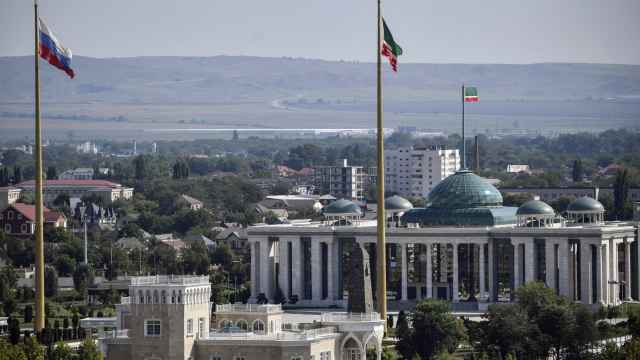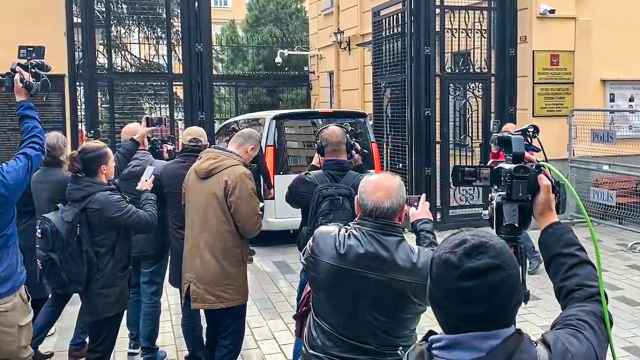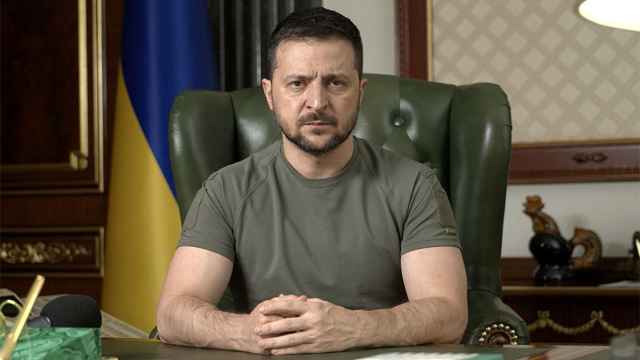In a recent article that ran in Russia Beyond the Headlines, a newspaper supplement that is produced by state-owned Rossiiskaya Gazeta and is distributed to leading publications around the world, political correspondent Dmitry Babich wrote: "The much-praised middle class … who were behind the protests never threatened Putin with strikes. The reason was simple: The city could happily live with those people striking."
But this time the journalist was mistaken. As recently as this past weekend, Russia faced the threat of a strike by some of its most popular celebrities.
As Kommersant reported Saturday, Ksenia Sobchak — socialite, television host and one of the leaders of the protest movement that arose in December — was slated to host a Muz-TV music awards ceremony June 1, as she has done for the past four years. But Sobchak learned at the last minute that she had been pulled from the program. Kommersant also reported that Sobchak would not take part in the TEFI awards ceremony, Russia's equivalent of the Emmys, which will take place Tuesday.
In response, Andrei Malakhov, a co-anchor with Sobchak on Muz-TV and a popular television host on Channel One, announced that he would boycott the music awards ceremony. Olga Shelest, another television anchor, refused to substitute for Sobchak.
In addition to Malakhov and Sobchak, two other pillars of Russian showbiz have been announced as co-hosts for the Muz-TV awards: Maxim Galkin and Lera Kudryavtseva. It is not difficult to imagine the anguish they must be experiencing, torn between a desire to show solidarity with their colleagues and the duty to fulfill paid contractual obligations.
A liberal who supports the anti-Putin movement might say, "This bloody regime has once again shown its beastly nature and love of censorship."
A leftist radical might say: "You have personally made these moral misfits into major television personalities. It's your own headache now that these Frankenstein monsters are no longer taking orders from you."
This brewing national crisis may be another ingenious Kremlin scheme. Sobchak and Malakhov are practically curse words for President Putin's conservative electorate. After all, Sobchak began her career as a host on the semi-erotic reality show "Dom-2" (House-2), and Malakhov hosts the tabloid television program "Pust Govoryat" (Let Them Talk), which brazenly flouts basic moral values. And the more these kinds of trashy television personalities are perceived as leaders of the democratic protest movement, the worse that movement will look in the eyes of Putin's core conservative supporters.
But at the same time, we must remember that Sobchak is the daughter of Anatoly Sobchak, who Putin worked for in the early 1990s when Sobchak was the mayor of St. Petersburg. Sobchak was also co-author of the 1993 Constitution, part of the first wave of post-Soviet democrats and a close associate of then-President Boris Yeltsin. From his post in the St. Petersburg mayor's office, Putin was appointed deputy chief of Yeltsin's presidential staff in 1997. To this day, Putin has a strong sense of loyalty to his mentor, Sobchak.
Putin clearly understands that any scandal involving Ksenia Sobchak will only increase her popularity and the potential financial payoff resulting from her notoriety. And deep in his heart, Putin must understand that the more celebrities like Sobchak and Malakhov leave television in protest, the easier it will be to attract normal people, ultimately making it unnecessary to create public television.
Indeed, the scheming of this former agent of the KGB's liberal, pro-Western Foreign Intelligence Service knows no boundaries.
Alexei Pankin is the editor of WAN-IFRA-GIPP Magazine for publishing business professionals.
A Message from The Moscow Times:
Dear readers,
We are facing unprecedented challenges. Russia's Prosecutor General's Office has designated The Moscow Times as an "undesirable" organization, criminalizing our work and putting our staff at risk of prosecution. This follows our earlier unjust labeling as a "foreign agent."
These actions are direct attempts to silence independent journalism in Russia. The authorities claim our work "discredits the decisions of the Russian leadership." We see things differently: we strive to provide accurate, unbiased reporting on Russia.
We, the journalists of The Moscow Times, refuse to be silenced. But to continue our work, we need your help.
Your support, no matter how small, makes a world of difference. If you can, please support us monthly starting from just $2. It's quick to set up, and every contribution makes a significant impact.
By supporting The Moscow Times, you're defending open, independent journalism in the face of repression. Thank you for standing with us.
Remind me later.





